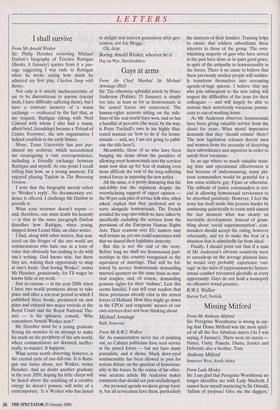From Mr R.WJ. Walker Sir: As commentators never tire of
pointing out, no Cabinet politicians have seen service in the armed forces — but nor have many journalists, and it shows. Much dewy-eyed sentimentality has been allowed to pass for serious debate on the question of homosexu- ality in the forces. In the course of his other- wise accurate article Mr Anderson makes comments that should not pass unchallenged.
Any personal agenda weakens group loyal- ty, but all servicemen have them, particularly the interests of their families. Training helps to ensure that soldiers subordinate these interests to those of the group. The over- whelming majority of gays who have served in the past have done so in quiet good grace, in spite of the antipathy to homosexuality in the forces. There is no cause to believe that these previously modest people will sudden- ly transform themselves into screaming agenda-of-rage queens. I believe that any who join subsequent to the new ruling will respect the difficulties of the issue for their colleagues — and will largely be able to restrain their notoriously voracious promis- cuity to out-of-working hours.
As Mr Anderson observes, homosexuals have been giving valuable service from the closet for years. What moral imperative demands that they 'should remain' there? The new legislation releases decent men and women from the necessity of deceiving their subordinates and superiors in order to satisfy their vocations.
In an age where so much valuable train- ing time and operational effectiveness is lost because of undermanning, many pla- toon commanders would be grateful for a few extra soldiers, gay, Fijian or otherwise. The attitude of junior commanders is cru- cial in allowing homosexual servicemen to be absorbed painlessly. However, I feel the army has itself made this process harder by continuing quixotically to resist until almost the last moment what was clearly an inevitable development. Instead of grum- bling about 'social experimentation', com- manders should accept the ruling, however reluctantly, and try to make the best of a situation that is admittedly far from ideal.
Finally, I should point out that if a man of Mr Anderson's obvious sensitivity were to eavesdrop on the average platoon lines, he would very probably experience 'out- rage' at the tales of (approximately) hetero- sexual conduct recounted gleefully at every opportunity. Gays do not hold a monopoly on offensive sexual practice.
R.W.J. Walker
Barton Turf, Norfolk


















































































 Previous page
Previous page